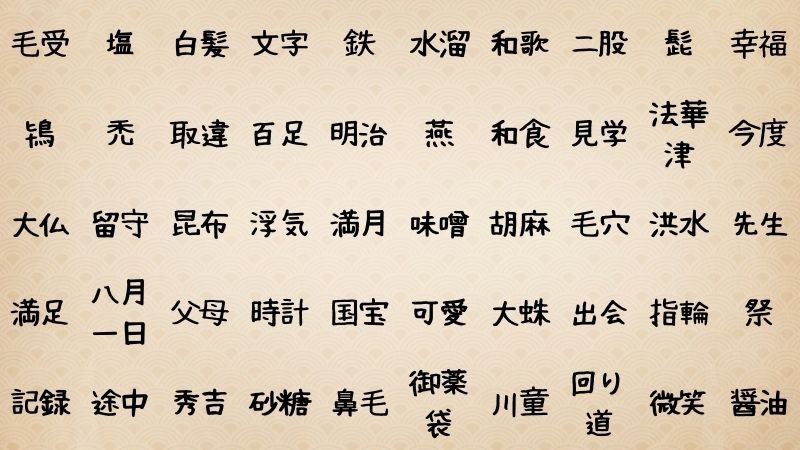Have you ever wondered what are the most unusual surnames in Japan? Those rare and strange names with bizarre and funny meanings? We have prepared a list of the 50 rarest surnames in Japan, some with only 20 people.
Japanese surnames have a long history, as they reflect characteristics or locality of families since their formation. Nowadays, it is common to have repeated surnames, but in some rare occasions we can find unique surnames.
We recommend reading: List of Japanese surnames 200+ Origin and Meanings

Table of Content
The origin of unique and uncommon Japanese surnames
Japanese surnames, although strange, can have a story related to the person's work. Their family may have originally worked as hairdressers or in salt production.
In addition to occupations, many Japanese surnames have geographical origins or are based on natural characteristics of the region where the family lived. For example, names like "水溜" (Mizutame) indicate a proximity to water reservoirs, while "昆布" (Kombu) suggests a connection to the harvesting of seaweed, common in coastal areas.
Other surnames, such as "白髪" (Shiraga) and "禿" (Hage), are physical descriptions that could have been nicknames based on an ancestor's appearance, such as white hair or baldness.
In addition, some surnames are deeply influenced by cultural and historical elements. Names like "大仏" (Daibutsu) reflect a connection with large Buddha statues, possibly indicating an association with Buddhist temples. Surnames like "八月一日" (Hozumi), which literally means "first of August," may have roots in significant events or festivals held on that date.
Other names, such as "満月" (Mangetsu), meaning "full moon," have a poetic origin, possibly related to events or natural features observed and appreciated by their ancestors.
The 50 rarest and strangest last names in Japan
- 毛受 (Menjo, Mozu) - Hair receiver, 1,200 people
- 塩 (Shio) - Salt, 990 people
- 白髪 (Shiraga) - White hair, 880 people
- 文字 (Moji) - Letter, character, 790 people
- 鉄 (Tetsu) - Iron, 770 people
- 水溜 (Mizutame) - Water reservoir, 740 people
- 和歌 (Waka) - Japanese poem, 500 people
- 二股 (Futamata) - Fork, 440 people
- 髭 (Hige) - Beard, mustache, 420 people
- 幸福 (Kōfuku) - Happiness, 410 people
- 鴇 (Toki) - Japanese Ibis, 390 people
- 禿 (Hage) - Bald, 390 people
- 取違 (Toritagai) - Wrong exchange, 370 people
- 百足 (Mukade) - Centipede, 360 people
- 明治 (Meiji) - Name of the Meiji era, 290 people
- 燕 (Tsubame) - Swallow, 260 people
- 和食 (Washoku) - Japanese food, 240 people
- 見学 (Kengaku) - Study visit, 210 people
- 法華津 (Hokkezu) - Unknown, 200 people
- 今度 (Kondo) - Next time, 200 people
- 大仏 (Daibutsu) - Great Buddha, 170 people
- 留守 (Rusu) - Absence, away from home, 170 people
- 昆布 (Kombu) - Seaweed used in cooking, 150 people
- 浮気 (Uwaki) - Infidelity, 150 people
- 満月 (Mangetsu) - Full moon, 140 people
- 味噌 (Miso) - Fermented soy paste, 130 people
- 胡麻 (Goma) - Sesame seeds, 130 people
- 毛穴 (Keana) - Poros, 130 people
- 洪水 (Kōzui) - Flood, 120 people
- 先生 (Sensei) - Professor, 110 people
- 満足 (Manzoku) - Satisfaction, 90 people
- 八月一日 (Hozumi) - First of August (peculiar reading) - 80 people
- 父母 (Fubo) - Country, 80 people
- 時計 (Tokei) - Watch, 60 people
- 国宝 (Kokuhō) - National treasure, 60 people
- 可愛 (Kawai) - Lovely, 50 people
- 大蜘蛛 (Ōkumo) - Great spider, 50 people
- 出会 (Deai) - Meeting, 50 people
- 指輪 (Yubiwa) - Ring, 40 people
- 祭 (Matsuri) - Festival, 30 people
- 記録 (Kiroku) - Register, 30 people
- 途中 (Tochū) - On the way, 30 people
- 秀吉 (Hideyoshi) - Historical proper name (Toyotomi Hideyoshi) - 30 people
- 砂糖 (Satō) - Sugar, 30 people
- 鼻毛 (Hanage) - Nose hair, 30 people
- 御薬袋 (Mikuburo) - Medicine bag, 30 people
- 川童 (Kawatarō) - Kappa (mythological aquatic creature) - 30 people
- 回り道 (Mawari Michi) - Detour, 20 people
- 微笑 (Hohoemi) - Smile, 20 people
- 醤油 (Shōyu) - Soy sauce, 20 people
The ranking of this article was published by Myoji-yurai.net and on this site you can find not only the ranking, but also the origin of each name, where people with these names are located, and other interesting information.
